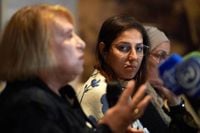On May 6, 2025, reports emerged that Franco-Algerian writer Kamel Daoud is facing significant legal challenges, including two international arrest warrants issued by a judge in Oran, Algeria. This unprecedented situation stems from his acclaimed novel Houris, which won the prestigious Goncourt Prize in 2024.
The first arrest warrant was issued by Interpol Algeria in March 2025, while the second was confirmed to have been sent to Daoud at the beginning of May 2025. Jacqueline Laffont, Daoud's lawyer, has stated that a preemptive request will be filed with Interpol's file control commission to contest the dissemination of these warrants, which she describes as politically motivated.
"The motivations of such Algerian warrants could only be political," Laffont asserted to Radio France, arguing that these actions are part of a broader effort to silence Daoud, whose novel addresses the dark period of Algeria's civil war from 1992 to 2002.
Daoud's troubles began when Saâda Arbane, a survivor of that civil conflict, filed multiple complaints against him, claiming that Houris is based on her personal story. Arbane's accusations include violations of medical confidentiality and invasion of privacy, asserting that Daoud used her experiences without her consent.
In a lawsuit filed in Algeria, Arbane alleges that her life story was appropriated for the character Aube in Daoud's novel, which follows a young woman's harrowing experiences during the war. Arbane, who lost her parents and siblings in a terrorist attack when she was only six years old, claims that Daoud's portrayal closely mirrors her own traumatic history.
"On three occasions, Kamel Daoud and his wife asked for the right to use my story. I refused each time," Arbane revealed in an interview. This refusal has led to her pursuing legal action, with one case currently set for a procedural hearing on May 7, 2025, in Paris.
In addition to the complaints in Algeria, Arbane is also suing Daoud and his publisher, Gallimard, in France for invasion of privacy and defamation, which could lead to a civil trial in the coming months. The legal proceedings are expected to delve into complex issues surrounding artistic freedom versus the right to privacy.
Daoud has consistently denied these allegations, emphasizing that Houris is a work of fiction inspired by the broader experiences of many victims of the Algerian civil war. In a December 2024 interview, he stated, "My novel has nothing to do with this woman. It is a novel of fiction, reflecting the stories of countless others. It does not cite her or recount her life. If she recognizes herself in it, I cannot help that."
Despite his denials, Arbane’s legal team argues that specific details in the novel—such as a unique breathing apparatus she uses—strongly indicate that Daoud drew upon her life story. They have prepared a comprehensive document outlining similarities between her life and the narrative in Houris, which they believe supports their claims.
As the legal battles unfold, the political implications of Daoud's situation cannot be ignored. His novel has been banned in Algeria, and he has faced increasing scrutiny from the Algerian government, particularly since he publicly defended fellow writer Boualem Sansal, who is imprisoned in Algeria. Daoud's lawyer has suggested that these legal actions are part of a campaign orchestrated by the Algerian regime.
"This campaign of defamation has been ongoing for months, but now the regime has reached a violent level of delirium," Daoud wrote in a recent essay, criticizing the political motivations behind the legal challenges he faces.
In light of these events, the question arises: to what extent does artistic freedom protect an author from legal repercussions when their work draws on real-life experiences? Legal experts suggest that while freedom of expression is a cornerstone of democracy, it is not without limits. The judge in Arbane's case will have to weigh the rights of the author against the privacy claims of the plaintiff.
Elvire Bochaton, a specialist in intellectual property law, explains that the legal landscape surrounding privacy and artistic expression is complex. "Generally, anything not known in the public sphere falls under privacy rights," she states. "There is a freedom of creation and expression, but it is not without limits. The judge will have to decide which right is more infringed upon—artistic freedom or the respect for privacy."
As Daoud prepares for his upcoming court appearances, including a hearing in Paris on May 7, the implications of this case extend beyond personal grievances. It represents a significant moment in the ongoing struggle between artistic expression and state control, especially in a region where the scars of conflict are still fresh.
In a broader context, Daoud's situation reflects the tensions between Algeria and France, particularly concerning issues of memory and representation of the civil war. The outcome of these proceedings may not only affect Daoud's career but could also set a precedent for how similar cases are handled in the future.
As the literary and legal worlds watch closely, Kamel Daoud stands at a critical juncture, navigating the treacherous waters of artistic freedom, personal history, and political power. The coming months will be pivotal, not just for him, but for the broader discourse on the rights of authors in a post-colonial context.




